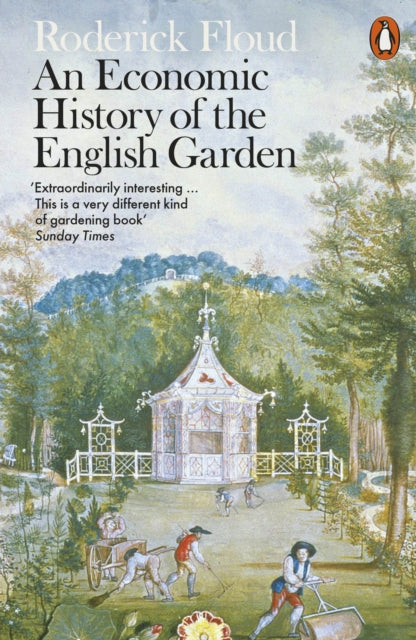Economic History of the English Garden
Economic History of the English Garden
- Condition: Brand new
- UK Delivery times: Usually arrives within 2 - 3 working days
- UK Shipping: Fee starts at £2.39. Subject to product weight & dimension
Couldn't load pickup availability
Every order you place qualifies you to win books of your choosing to the value of £500. You will be entered into our prize draw automatically.
UK residents only. Must be 18 years old or over. Ends 30 April.
Roderick Floud's AN ECONOMIC HISTORY OF THE ENGLISH GARDEN provides a fascinating insight into the history, money, places, and personalities involved in British gardens over the past 350 years, exploring how much gardens cost to build and maintain and their place in the economic and horticultural life of the nation.
Format: Paperback / softback
Length: 416 pages
Publication date: 05 November 2020
Publisher: Penguin Books Ltd
Roderick Floud's groundbreaking exploration of British gardens' past 350 years delves into the profound essence of why gardening is an integral part of this nation's soul. In his meticulously researched work, Floud raises thought-provoking questions about the costs associated with building and maintaining gardens, as well as the sources of funding. This captivating book offers a wealth of information that will both delight economists and gardeners alike. Floud takes readers on a journey through grand and humble gardens, introducing them to a diverse range of gardeners, plantsmen, and technologies. With his engaging writing style, he paints a vivid picture of the historical, economic, and horticultural significance of gardens in England.
Since the seventeenth century, the English population has been captivated by gardens, continuously creating, enhancing, and envisioning them. However, until now, no book has delved into the critical question of how much gardens and gardening have cost, and their place in the economic and horticultural life of the nation. Floud's work stands as a groundbreaking contribution to the field of gardening history, offering a fresh perspective that goes beyond traditional horticultural narratives.
Beginning with the Restoration of Charles II in 1660, Floud traces the historical development of gardens, highlighting the roles played by the monarchy, central and local government, and the aristocratic or plutocratic builders who created the magnificent gardens of Stuart, Georgian, and Victorian England. He recognizes the designers of these gardens as both artists and businessmen, often earning substantial sums by modern standards, comparable to the nurserymen and plant collectors who supplied their plants. Floud's research uncovers the intricate connections between these individuals and the broader economic and social landscape of the time.
Through his meticulous analysis, Floud sheds light on the economic implications of gardens. He explores the costs associated with building and maintaining gardens, including the materials used, labor expenses, and the depreciation of garden structures over time. He also examines the sources of funding for these projects, including private individuals, wealthy landowners, and government subsidies. Floud's insights into the financial aspects of gardening provide valuable information for historians, economists, and policymakers alike, as they help understand the economic impact of cultural and recreational activities on society.
Moreover, Floud's book goes beyond the mere economic considerations and delves into the cultural and social significance of gardens. He explores the role of gardens in shaping the identity and values of different communities, as well as their impact on the environment and biodiversity. Gardens have long been recognized as spaces for relaxation, contemplation, and social interaction, providing a respite from the busy urban life. Floud's work highlights the ways in which gardens have contributed to the well-being of individuals and communities, fostering a sense of belonging and promoting social cohesion.
In conclusion, Roderick Floud's groundbreaking study of British gardens' past 350 years offers a fascinating insight into why gardening is an integral part of this nation's soul. Through his meticulous research, Floud raises thought-provoking questions about the costs, funding, and cultural significance of gardens. His book is a valuable contribution to the field of gardening history, providing valuable information for historians, economists, and policymakers alike. By exploring the historical, economic, and horticultural aspects of gardens, Floud sheds light on the profound impact of these spaces on individuals, communities, and the nation as a whole.
Weight: 336g
Dimension: 129 x 197 x 29 (mm)
ISBN-13: 9780141981703
This item can be found in:
UK and International shipping information
UK and International shipping information
UK Delivery and returns information:
- Delivery within 2 - 3 days when ordering in the UK.
- Shipping fee for UK customers from £2.39. Fully tracked shipping service available.
- Returns policy: Return within 30 days of receipt for full refund.
International deliveries:
Shulph Ink now ships to Australia, Canada, France, Germany, New Zealand and the United States of America.
- Delivery times: within 5 - 20 business days when ordering to France, Germany, Canada and the United States. Up to 30 business days for Australia and New Zealand.
- Shipping fee: charges vary for overseas orders. Only tracked services are available for international orders.
- Customs charges: If ordering to addresses outside the United Kingdom, you may or may not incur additional customs fees during local delivery.



 Excellent
Excellent